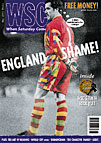 The European Parliament is looking forward to Euro 96 almost as much as we are, according to Philip Cornwall
The European Parliament is looking forward to Euro 96 almost as much as we are, according to Philip Cornwall
There’s a language school in London offering English courses to overseas fans which has captured a few headlines recently; perhaps they could also try teaching the Met enough Dutch, German and French to help the thousands following the Netherlands and Switzerland to Euro ’96.
Up and down the country, multi-lingual policemen should be going through their paces to ensure that they can not only liaise with their colleagues who are travelling with the national contingents, but also to do something to boost sales of Dixon of Dock Green videos in assorted European tongues. It will undoubtedly help the game’s image – and Britain’s – if the police the fans meet are less reminiscent of the terminally-suspicious wannabe Inspector Burnsides we all meet at away ends up and down the country. In Nottingham, at least, a few words of Portuguese, Croatian and Turkish are indeed being taught to the City’s finest.
This positive European approach is being taken at higher levels, too. It must have gone against his Euro-sceptical grain, but Michael Howard was in Brussels last month, seek-ing a common approach to law and order issues relating to football. But that is focussing quite tightly on football as a potential problem. The following week, the European Parliament, while still stressing the need on occasion to keep part-icular people apart, balanced this with a clear recognition that one of the points of the competition, and something which could be a service to Europe as a whole, was that it will bring people together.
In terms of the total of participating European countries and the numbers they will bring, the Championships will be the largest multi-cultural event to take place in the continent since the Second World War (literally). If the European Mission is to be a success, then anything which can bring down the remaining barriers of mutual distrust is an important opportunity. 1996 should at least be an improvement on 1939-45.
The hearings held by the Committee on Civil Liberties and Internal Affairs demonstrated an awareness that the issue is a complex one. Football can bring with it violence based on race, yet it “is a wonderful sport with great potential for helping to eliminate prejudices”. People’s right to freedom of movement within the EU conflicts with security interests. The media’s use of jingoism in the build-up to matches contributed to the problem, and their reporting can glamourize violence – but it nonetheless needs reporting. And so on, through the whole paradoxical business of reconciling order and freedom.
Sadly, an awareness of the game’s context was conspicuously lacking in one of those invited to discuss the matter with them: Ernie Walker, formerly of the SFA, now of UEFA’s stadium committee. As the sole representative of another supranational body, it was surely the hope of the Committee that he would provide a wide perspective on the issues at stake. “Individual clubs, associations and players must face up much more positively to their social policy tasks and responsibilities,” as the draft report put it.
Instead, Walker demonstrated a rare capacity to talk and say nothing at length, though we learnt a little of his childhood interest in the American West. UEFA were willing to co-operate with others to make football safe and enjoyable, but beyond putting enormous faith in the civilizing power of all-seater stadia (see page 40), Walker had little to offer.
In a bizarre section of his submission he admitted that standing was probably safer, by pointing out that if you stood in the middle of a field then no buildings could fall on you, but apparently sitting down was a panacea for behavioural problems. He acknowledged that this was more expensive for supporters, but felt that “that was a price worth paying for progress”. It would be interesting to know how often he has had to pay that price himself. The submission from an Italian FA official was not much more enlightening. It was the journalist with experience of the German fan projects, and John Williams of Leicester University, who echoed the Committee in seeing football in a wider context – as you would expect from a social worker and a sociologist.
An afternoon in Brussels, spent talking about the way in which various countries’ hooligans differ or are alike, and broadening the definition of deprived to take in cultural deprivation, as well as financial want, is not in itself going to guarantee a trouble-free Euro ’96. However, hope for France 1998 and beyond lies in all those with a role to play sharing their knowledge and being willing to learn from others. Depressingly, those in authority inside the game are now even more out of touch on this issue than Conservative politicians.
Let’s hope Ernie Walker was a better listener than speaker.
From WSC 111 May 1996. What was happening this month